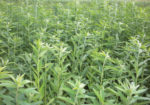Advertise Follow Us
Articles Tagged with ''nitrogen fixation''
No-Till Notes
Nitrogen on Soybeans: To Use or Not to Use
No-tillers wanting to break a yield plateau with soybeans should study the nitrogen cycle and identify environments where additional applications makes sense.
Read More
Copper Keys Plant Function, But Watch Out For Toxicity
Essential in all plants but needed only in small doses, no-tillers must identify a crop’s proper copper need to protect cell development and grain production.
Read More
New, Recycled Cover Crops Showing Plenty of Potential
Add more diversity and numerous soil-building benefits to no-till with these up-and-coming options.
Read More
Inoculants Eke a Few More Bushels — and Great Returns — Out of Soybeans
Yield increases may seem small, but so is the cost of inoculation, requiring a half-bushel yield response before hitting a payout.
Read More







